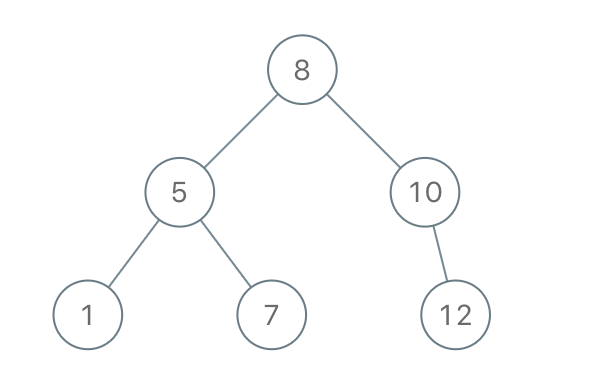Return the root node of a binary search tree that matches the given preorder traversal.
(Recall that a binary search tree is a binary tree where for every node, any descendant of node.left has a value < node.val, and any descendant of node.right has a value > node.val. Also recall that a preorder traversal displays the value of the node first, then traverses node.left, then traverses node.right.)
Example 1:
Input: [8,5,1,7,10,12] Output: [8,5,10,1,7,null,12]
Note:
1 <= preorder.length <= 100- The values of
preorderare distinct.
Related Topics:
Tree
// OJ: https://leetcode.com/problems/construct-binary-search-tree-from-preorder-traversal/
// Author: github.com/lzl124631x
// Time: O(N^2)
// Space: O(H)
class Solution {
private:
TreeNode* construct(vector<int> &preorder, int begin, int end) {
if (begin >= end) return NULL;
auto root = new TreeNode(preorder[begin]);
int i = begin + 1;
while (i < end && preorder[i] < preorder[begin]) ++i;
root->left = construct(preorder, begin + 1, i);
root->right = construct(preorder, i, end);
return root;
}
public:
TreeNode* bstFromPreorder(vector<int>& preorder) {
return construct(preorder, 0, preorder.size());
}
};Or use find_if:
// OJ: https://leetcode.com/problems/construct-binary-search-tree-from-preorder-traversal/
// Author: github.com/lzl124631x
// Time: O(N^2)
// Space: O(H)
class Solution {
typedef vector<int>::iterator iter;
TreeNode* dfs(vector<int>& A, iter begin, iter end) {
if (begin == end) return NULL;
auto root = new TreeNode(*begin);
auto mid = find_if(begin + 1, end, [&](int x) { return x > *begin; });
root->left = dfs(A, begin + 1, mid);
root->right = dfs(A, mid, end);
return root;
}
public:
TreeNode* bstFromPreorder(vector<int>& A) {
return dfs(A, A.begin(), A.end());
}
};We use a stack<pair<TreeNode*, int>> s to keep track of the parent nodes where the first item in the pair is the parent node, and the second item is the right bound of the parent node (i.e. the grandparent's node value).
- If the current node value is smaller than the value of the parent node at the stack top, we should add this new node as the left child of the parent node, and push
node, s.top().first->valto the stack top. - Otherwise, we keep popping the stack top until
A[i] < s.top().second. Then we add the new node as the right child of the parent node at the stack top, and pushnode, s.top().secondto the stack top.
// OJ: https://leetcode.com/problems/construct-binary-search-tree-from-preorder-traversal/
// Author: github.com/lzl124631x
// Time: O(N)
// Space: O(H)
class Solution {
public:
TreeNode* bstFromPreorder(vector<int>& A) {
stack<pair<TreeNode*, int>> s;
s.emplace(new TreeNode(A[0]), INT_MAX);
auto root = s.top().first;
for (int i = 1; i < A.size(); ++i) {
auto node = new TreeNode(A[i]);
if (A[i] < s.top().first->val) {
s.top().first->left = node;
s.emplace(node, s.top().first->val);
} else {
while (A[i] > s.top().second) s.pop();
s.top().first->right = node;
s.emplace(node, s.top().second);
}
}
return root;
}
};// OJ: https://leetcode.com/problems/construct-binary-search-tree-from-preorder-traversal/
// Author: github.com/lzl124631x
// Time: O(N)
// Space: O(H)
// Ref: https://leetcode.com/problems/construct-binary-search-tree-from-preorder-traversal/discuss/252232/JavaC%2B%2BPython-O(N)-Solution
class Solution {
int i = 0;
public:
TreeNode* bstFromPreorder(vector<int>& A, int bound = INT_MAX) {
if (i == A.size() || A[i] > bound) return NULL;
auto root = new TreeNode(A[i++]);
root->left = bstFromPreorder(A, root->val);
root->right = bstFromPreorder(A, bound);
return root;
}
};